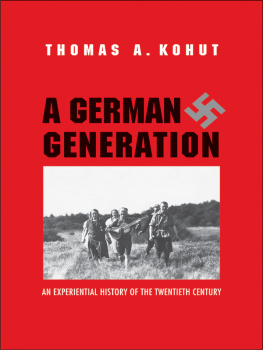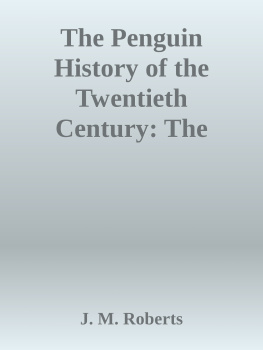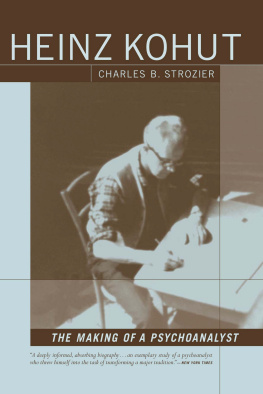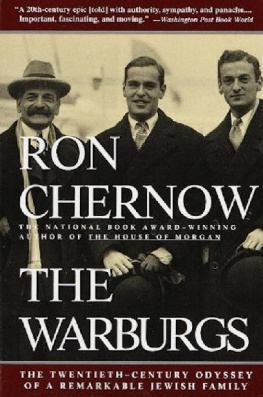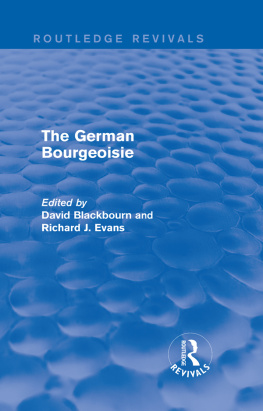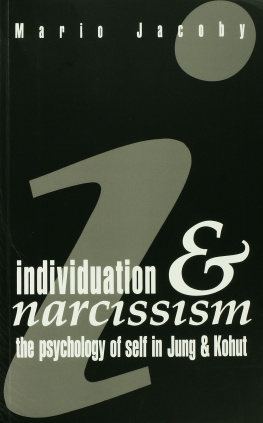Kohut - A German generation: an experiential history of the twentieth century
Here you can read online Kohut - A German generation: an experiential history of the twentieth century full text of the book (entire story) in english for free. Download pdf and epub, get meaning, cover and reviews about this ebook. City: Germany;New Haven Conn, year: 2013;2012, publisher: Yale University Press, genre: Religion. Description of the work, (preface) as well as reviews are available. Best literature library LitArk.com created for fans of good reading and offers a wide selection of genres:
Romance novel
Science fiction
Adventure
Detective
Science
History
Home and family
Prose
Art
Politics
Computer
Non-fiction
Religion
Business
Children
Humor
Choose a favorite category and find really read worthwhile books. Enjoy immersion in the world of imagination, feel the emotions of the characters or learn something new for yourself, make an fascinating discovery.
- Book:A German generation: an experiential history of the twentieth century
- Author:
- Publisher:Yale University Press
- Genre:
- Year:2013;2012
- City:Germany;New Haven Conn
- Rating:5 / 5
- Favourites:Add to favourites
- Your mark:
- 100
- 1
- 2
- 3
- 4
- 5
A German generation: an experiential history of the twentieth century: summary, description and annotation
We offer to read an annotation, description, summary or preface (depends on what the author of the book "A German generation: an experiential history of the twentieth century" wrote himself). If you haven't found the necessary information about the book — write in the comments, we will try to find it.
Kohut: author's other books
Who wrote A German generation: an experiential history of the twentieth century? Find out the surname, the name of the author of the book and a list of all author's works by series.
A German generation: an experiential history of the twentieth century — read online for free the complete book (whole text) full work
Below is the text of the book, divided by pages. System saving the place of the last page read, allows you to conveniently read the book "A German generation: an experiential history of the twentieth century" online for free, without having to search again every time where you left off. Put a bookmark, and you can go to the page where you finished reading at any time.
Font size:
Interval:
Bookmark:
A GERMAN GENERATION
OF THE TWENTIETH CENTURY

Published with assistance from the Mary Cady Tew Memorial Fund.
Copyright 2012 by Yale University.
All rights reserved.
This book may not be reproduced, in whole or in part, including illustrations, in any form (beyond that copying permitted by Sections 107 and 108 of the U.S. Copyright Law and except by reviewers for the public press), without written permission from the publishers.
Yale University Press books may be purchased in quantity for educational, business, or promotional use. For information, please e-mail (U.K. office).
Designed by Mary Valencia.
Set in Sabon type by Newgen North America.
Printed in the United States of America.
Library of Congress Cataloging-in-Publication Data
Kohut, Thomas August.
A German generation : an experiential history of the twentieth century / Thomas A. Kohut.
p. cm.
Includes bibliographical references and index.
ISBN 978-0-300-17003-0 (hardback)
1. GermanyHistory20th century. 2. GermanySocial conditions20th century. 3. GermansEthnic identity. 4. World War, 19141918Germany. 5. World War, 19391945Germany. 6. National socialism. 7. Oral historyGermany. I. Title.
DD232.K645 2012
943.087dc23
2011016844
A catalogue record for this book is available from the British Library.
This paper meets the requirements of ANSI/NISO Z39.481992 (Permanence of Paper).
10 9 8 7 6 5 4 3 2 1
In memory of my father, Heinz Kohut, proud Austrian Pfadfinder and contemporary of those at the heart of this study
The historical events and decisions that really count play themselves out among all of us who are anonymous, in the heart of every accidental and private individual person. The most powerful dictators, ministers, and generals are completely powerless in the face of these simultaneous mass decisions, often made by people who are unaware that they have decided anything. And it is characteristic of these decisive events that they never appear as mass phenomena.... Instead these decisive events occur only as the result of the apparently private experiences of thousands and millions of individuals.
SEBASTIAN HAFFNER, Geschichte eines Deutschen
Over the more than fifteen years that I have worked on this project, so many people generously provided advice and support that not all of them can be acknowledged here. I would like to begin, however, by thanking three historians whose support long predates my work on this project. Ronald Suny was one of my teachers when I was a student at Oberlin College. His courses prompted me to apply to graduate school in history. Rons influence testifies to the power of a teacher to inspire a student, even when the teacher is standing at the front of a large lecture hall and the student is a wholly unremarkable undergraduate sitting quietly at the back of the room. Peter Gay and John Demos have been constant sources of inspiration and support throughout the course of my career, beginning in Peters case when I was still a graduate student at the University of Minnesota. Their sophisticated, creative, and courageous scholarship has provided a model of psychologically sensitive history to emulate. What successes I have achieved as a historian over the years I owe as much to Peter and to John as to anyone. Indeed, when I sought a publisher for the manuscript of this book, I turned to John for advice. His willingness to read the manuscript and to contact the history editor at Yale University Press about it launched the process that has led to this books publication. I would like to thank Peter Gay and John Demos most, however, for their faith in me as a historian.
I would like to thank Christopher Rogers, editorial director at Yale University Press, for his excellent advice to shorten the manuscript by about a third as well as for his more intangible intellectual and moral support. I would also like to acknowledge Christina Tucker, assistant editor at Yale, for her patience, gentle prodding, and intelligent suggestions, as well as Laura Davulis and the production editor, Ann-Marie Imbornoni, who has been a pleasure to work with. The thoughtful, knowledgeable, and insightful comments and suggestions of the two readers for Yale University Press about my manuscript resulted in a significantly improved book. Finally, I would like to express my gratitude to Robin DuBlanc. Not only did Robin do a masterful and meticulous job in copyediting the manuscript, she proved to be a wise, thoughtful, and understanding counselor and collaborator not only on the style but also on the substance of this book. She was wonderful to work with.
I would like to thank Dr. Susanne Rappe-Weber, director of the Archiv der deutschen Jugendbewegung, for providing the photograph by Julius Gross on the dust jacket and for granting me permission to reprint it.
I would like to thank the Khler Stiftung. Its financial support in 199596 enabled me to participate in the research project Die Freideutschen: Seniorenkreise aus jugendbewegter WurzelEin Modell fr sinnerflltes Alter, sponsored by the University of Siegen in Germany and funded by the Federal Ministry for Family, Senior Citizens, Women, and Youth of the German government. Dr. Lotte Khler and the late Dr. Hans Kilian, two intelligent, knowledgeable, and passionate supporters of psychosocial research, offered critiques of my work that helped sharpen my analysis of the interviews that were at the scholarly heart of the Siegen project. I would also like to thank the Academy of Science at the University of Siegen, where I was a member in 199596. The academy supported me financially and gave me an academic home while I was working on the University of Siegen project.
Additionally, I would like to acknowledge the president and board of trustees of Williams College for the sabbatical support I received over the three leaves I used to research and write this book. I would particularly like to thank Morton O. Schapiro who, as president of Williams, granted me a yearlong sabbatical while I was dean of the faculty, a leave that allowed me to make decisive progress on this book and to maintain my identity as a historian during the six years I was a college administrator. The support I received from the college testifies to the importance that Williams places on having a faculty of active and productive scholars.
I would like to express my gratitude to the three academics, then young, who conducted the interviews on which this book is based, Sabiene Autsch, Babett Lobinger, and Heiner Seidel. Babett and Heiner remained friends and colleagues long after the conclusion of the Siegen project on which we worked so well together. Heiners recent, unexpected death casts a shadow over the publication of a book to which he contributed so significantly.
Helena Johnson, my former student at Williams, was my research assistant on this project. With her tenacity, intelligence, good historical judgment, and fluency in German, Helena contributed substantially to the historio-graphical essays that are an important part of this book.
A number of colleagues at Williams College, at Exeter College of Oxford University, and elsewhere in England, the United States, and in Germany offered valuable advice and/or support on this project: Richard Bessel, Elisabetta Brighi, Geoffrey Cocks, Robert Dalzell, John Downey, Stephen Fix, Lerke Gravenhorst, Regina Kunzel, John MacLeod, Judy Malone, Bojana Mladenovic, Ben Morgan, Simon Mortimore, Frank Oakley, Claudia Olk, Hanna Schissler, Roslyn Schloss, Olga Shevshenko, Paul Slack, Ileene Smith, William Wagner and James Wood. I would particularly like to acknowledge Georges Dreyfus for his help with the books title and Pauline Nestor of Monash University in Australia for informing me that no press would accept for publication a manuscript that had 73,637 words of notes. Jeri Johnsons friendship and advice were of crucial personal and intellectual importance during the two years I was working on this book in Oxford.
Next pageFont size:
Interval:
Bookmark:
Similar books «A German generation: an experiential history of the twentieth century»
Look at similar books to A German generation: an experiential history of the twentieth century. We have selected literature similar in name and meaning in the hope of providing readers with more options to find new, interesting, not yet read works.
Discussion, reviews of the book A German generation: an experiential history of the twentieth century and just readers' own opinions. Leave your comments, write what you think about the work, its meaning or the main characters. Specify what exactly you liked and what you didn't like, and why you think so.

